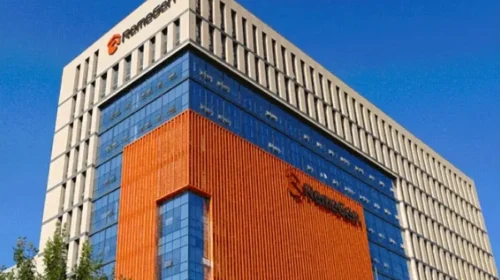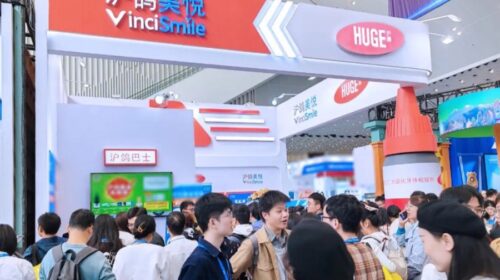Dental Doctor All Smiles in IPO Bid, But New Policy Could Bring Financial Toothaches

Provider of middle- to high-end dental services in China’s affluent Yangtze River Delta area has filed a second application for a Hong Kong IPO
Key takeaways:
- Dental Doctor Medical has applied for a Hong Kong listing, reporting a gross margin of 54.6% in 2021 – much higher than the industry average of 31%
- China’s plan to include dental implant equipment in centralized procurement programs could significantly reduce costs for company’s government-owned competitors
By Molly Wen
Dentistry has one of the most diverse client bases in the medical field. From children with cavities, to young men and women seeking whiter teeth and seniors in need of implants, dentists and orthodontists can always count on a steady stream of customers.
Driven by that large demand, a new generation of private dental practices is also flourishing in China and looking to financial markets to fund their growth. The latest of those is Dental Doctor Medical Holding Group Co. Ltd., which calls itself the biggest middle- to high-end private dental hospital in Eastern China. The company has just submitted an IPO application to the Hong Kong Stock Exchange for a second time.
Dental Doctor submitted its first application last September, but failed to list within the required six-month window after that. Its original prospectus showed solid growth, with the company’s revenues rising from 870 million yuan ($137 million) in 2019 to 1.07 billion yuan in 2021, equating to a compound annual growth rate of 11%. Its adjusted profits grew steadily in parallel, from 23.64 million yuan to 125 million yuan over the same period.
The company set up its first clinic in the city of Suzhou in Jiangsu province near Shanghai, and has been rapidly expanding across Eastern China over the past decade. By March this year it had 31 dental clinics in some of the country’s most affluent cities, including Suzhou, Nanjing, Shanghai and Wenzhou. But it continues to be highly dependent on its operations in Suzhou and the surrounding areas, with 19 of its clinics in that part of Jiangsu province. As a result, it derives 75.6% of its revenue from the province.
But as the Omicron virus flares up in eastern China, leading to a complete lockdown of nearby Shanghai, Suzhou has also enforced travel restrictions that will likely have a negative impact on the company. What’s more, people often tend to avoid hospitals and dental clinics during such flare-ups for fear of getting infected.
Eastern China is the country’s wealthiest area, making it fertile ground for dental services as Chinese becoming more aware of the importance of dental health. According to third-party research in the prospectus, the dental service market in Eastern China will more than triple from 62.8 billion yuan in 2020 to 212.5 billion yuan in 2030. With a slogan of “each tooth backed by a team of doctorates,” Dental Doctor has found a relative goldmine in that Eastern China home where the market for its higher-end services was worth 6.9 billion yuan in 2020, or around half of the national market for those services.
Fat gross margin
Booming demand has lifted most players in China’s fast-growing dental sector, though some companies are more profitable than others. Dental Doctor is one of the better performers, posting gross margins between 53% and 56% over the last three years, much higher than the industry average of 31% in 2020. The company owes its fatter margins to its dental implant and correction businesses, which dominate its portfolio and are more profitable than tooth removal and filling services that are the mainstay of other private clinics. In 2021, for example, dental implants and corrections contributed 44.7% and 22.8% of the company’s revenue, respectively.
Dental implants and corrections are the two most vaunted sub-fields in dentistry, driven by huge demand from appearance-conscious young consumers. Middle-aged and senior citizens are also customers when they have to deal with tooth loss. Dental Doctor charges an average of 6,445 yuan for implants, according to its latest figures. Such high prices mean an average dental correction case can rack up 21,115 yuan in bills, compared to an average of 837 yuan for more common dental services. Adding in the fact that implants are a relatively quick procedure, that part of the company’s business has a gross margin as high as 60.9%.
But its industry-beating gross margin don’t wash through to the bottom line. Despite its continual improvement every year starting in 2019, its net profit margin has never exceeded 12%, far less than around 30% for its competitor Topchoice Medical (600763.SH).
The weak net margins may owe partly to Dental Doctor’s big spending on marketing as it seeks to boost its brand. Its sales and distribution expenses totaled around 300 million yuan in 2021, equal to nearly 30% of its revenue that year, trumping all other dental service providers. By contrast, the more established Topchoice spends less than 1% of revenue on sales costs each year and only 20 million yuan on marketing.
As the Chinese population continues to age, potential demand for dental implant services is growing fast. According to the company’s prospectus, around 21 out of every 10,000 Chinese sought such services in 2020, far below the 85 for the U.S. and a hefty 630 for South Korea, showing penetration rates in China are currently quite low.
New policy to benefit rivals
But the government doesn’t seem to be on Dental Doctor Medical’s side. At a State Council meeting on Jan. 10 this year, Beijing announced an expansion in the types of high-value medical equipment covered by government centralized procurement programs, especially for dental implants. Based on big discounts the government demands, prices for equipment used for dental implants are expected to drop by close to 80%.
These polices, once implemented, will almost certainly deal a major blow to Dental Doctor’s implant business by sharply lowering costs for its government-owned rivals. According to a research report by Pacific Securities, equipment expenses account for around three-quarters of the total cost of dental implant services, with treatment costs making up the rest. Thus an 80% decline in equipment fees would give government-owned facilities a huge edge over private sector rivals by lowering their costs by around 60%.
Such policy uncertainties have made investors wary of dental companies. Arrail Group (6639.HK), a private dental service provider with a similar business portfolio to Dental Doctor’s, listed in Hong Kong on 22 March, and declined 5.61% on its first trading day. In terms of price-to-sales (P/S) ratios, Arrail Group and Topchoice Medical have ratios of 4.5 times and 17 times, respectively. Using the mean of 11 times for that pair, Dental Doctor can expect an IPO valuation of 11.8 billion yuan.
We should note here that before its first IPO application last September, Dental Doctor was valued at a far more modest 2.65 billion yuan after its series-B financing. But perhaps stock market investors will see more to the company than private equity, which would be certain to leave smiles on everyone’s faces.
To subscribe to Bamboo Works free weekly newsletter, click here






